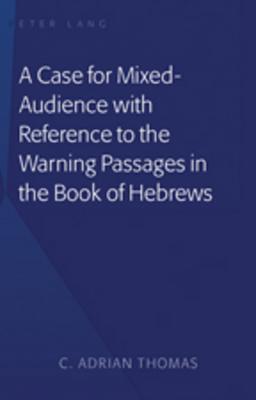A Case for Mixed-Audience with Reference to the Warning Passages in the Book of Hebrews discusses the nature of the warnings in Hebrews and how these warnings relate to the theological question of the eternal security of believers. The main argument is that these warnings are intended to target a particular segment of the author’s community, about whose appropriation of and subsequent attitude toward the Christian message he was deeply concerned. That is to say, while the book of Hebrews is addressed as a message of encouragement to the community as a whole, its warnings are aimed at a certain element in the community whose salvation is threatened by a possible dangerous course of action. The book implies that while the author is persuaded that the majority in the community are genuine believers, there are some about whose salvation he doubts; hence the case for a mixed-audience. What is threatened, therefore, is not a salvation already possessed, but the salvation of those in danger of coming up short.
Theologically, the work falls within the sphere of the Calvinistic-Arminian debate regarding the assurance of salvation and the perseverance of the saints. It argues strongly for the Calvinistic position, but does so within the confines of the discipline of biblical studies, and lends extensive exegetical support to the Calvinistic position on the warning passages. The book is highly recommended for Bible College and seminary students and professors, as well as pastors and lay leaders who must give answers to their parishoners on those tough warning passages in Hebrews.
| FindBook |
有 1 項符合
A Case for Mixed-Audience with Reference to the Warning Passages in the Book of Hebrews的圖書 |
 |
A Case for Mixed-Audience with Reference to the Warning Passages in the Book of Hebrews 作者:Thomas 出版社:Peter Lang Inc., International Academic Publi 出版日期:2008-09-30 語言:英文 規格:精裝 / 327頁 / 普通級 |
| 圖書館借閱 |
| 國家圖書館 | 全國圖書書目資訊網 | 國立公共資訊圖書館 | 電子書服務平台 | MetaCat 跨館整合查詢 |
| 臺北市立圖書館 | 新北市立圖書館 | 基隆市公共圖書館 | 桃園市立圖書館 | 新竹縣公共圖書館 |
| 苗栗縣立圖書館 | 臺中市立圖書館 | 彰化縣公共圖書館 | 南投縣文化局 | 雲林縣公共圖書館 |
| 嘉義縣圖書館 | 臺南市立圖書館 | 高雄市立圖書館 | 屏東縣公共圖書館 | 宜蘭縣公共圖書館 |
| 花蓮縣文化局 | 臺東縣文化處 |
|
|
圖書介紹 - 資料來源:博客來 評分:
圖書名稱:A Case for Mixed-Audience with Reference to the Warning Passages in the Book of Hebrews
內容簡介
作者簡介
The Author: C. Adrian Thomas is a graduate of Dallas Theological Seminary, where he received his Master’s degree in theology and Ph.D. in New Testament Studies. He has taught Bible and theology for several years at the Midland Bible Institute in Jamaica, and has also served as pastor at the Pitfour Gospel Chapel in Montego Bay, Jamaica. Dr. Thomas is a member of the First Baptist Church of Forney, Texas, and serves as part of the leadership team in the church’s discipleship program.
|










